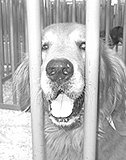They may become one of the largest set of casualties, evacuees and victims without family, homes, shelter, food, water and medicine. They are the dogs, cats, birds, pot-bellied pigs, horses, livestock, and other pets and animals left behind as Katrina hurled winds and water on the coasts of Mississippi, Louisiana and Alabama.
From chihuahuas to quarter horses, they are quickly flooding into the shelters organized by the Mississippi Board of Animal Health. With help from groups like the Humane Society of the United States, In Defense of Animals, the Mississippi Animal Rescue League, the ASPCA, MSU Veterinary School, Riders of the Storm (specializing in horse disaster relief), Animal Planet, and countless others from Florida, Missouri and beyond, the Mississippi Board of Animal Health has established an organized shelter, clinic, and rescue operation not only for the wide array of animals that fled with their owners from the devastated coastline but also an ever-increasing number of animals left behind in homes and shelters.
At the livestock area of the Mississippi State Fairgrounds, many volunteers and coordinators were eager to share their stories; most began with the three massive, pot-bellied pigs that rode with their owners from Biloxi. Eventually, the stories all centered on the crates and kennels filled with the wagging tails of innumerable animals from pit bulls, dobermans and hounds, to Siamese kittens only a few months old, to the numerous horses and singing parakeets. Even a goat now calls the Fairgrounds home. These are the animals that are being walked and fed on a required schedule by their sheltered owners in the fairgrounds and surrounding hotels.
Doll Stanley, director of investigations for In Defense of Animals, quickly took me by the hand, and began showing me the underpinnings (even politics) of the rescue effort. Several animal professionals and volunteers have not been allowed into the devastated areas to rescue and treat the animals left behind, she said. Those animals are the ones in dire need due to a lack of food and clean water. You could sense frustration and anguish in her voice as she relayed the current helplessness of many rescue groups that are planning to head farther south to begin their efforts.
Still, some abandoned animals are making their way to the rescue kennel/triage at the Fairgrounds. Stanley and several volunteers enthusiastically took me to an area away from the evacuees' pets to see the first round of animal refugees. There appeared to be 75 to 100 dogs barking, coughing, and shivering as they began to feel the overall stress of relocation and the traumatic change in environment. This batch was from a shelter in Gulfport and had been left to weather the storm.
Each of the animals was washed several times in a special concoction to fight infection, remove bacteria and other residue left by Katrina. Quite a few were treated for scrapes, cuts and infections, and many were groomed to rid them of napped coats.
These animals would have no hope without the countless volunteers—many sleeping on bags of dog food for several nights in a row—dedicated to caring for these animals and the countless others that will begin flooding the shelters throughout the United States for several more weeks. The volunteers and professionals are enduring sweltering heat and back-breaking work as they unload feed and supplies for the animals while organizing a massive effort to go into Katrina-stricken areas to save family pets and displaced animals.
How to Help If you are a member of an animal organization, make a donation earmarked for Katrina relief. If you are not a member of an animal organization, you can mail a monetary donation to the Humane Society of the United States, Dept. DRFHBM, 2100 L St., NW, Washington, D. C., 20037 or visit their Web site at http://www.hsus.org to donate online.
Other items needed now that can be taken to the Mississippi Coliseum:
Dry dog and puppy food
Dry cat and kitten food as well as cat litter
Durable animal toys (large and small)
Wire and chicken wire (for mending cages and preventing smaller animals from harming themselves in cages)
Leashes and water bowls
For horses: sweet feed, oats, and senior feed as well as hay for feed and stalls
Pig feed
If you have a supply of pet medicines, hay or feed, please contact the Mississippi Animal Disaster Relief at 601-359-5130.
They are currently well equipped with volunteers but may need many more in the future. If you are interested in volunteering time, call 601-359-5130.
The ASPCA has set up two databases, the first to help families find their lost pets. In order to register your pet, please send your contact information and a description of the pet including name and breed to [e-mail missing] or register via telephone at 212-876-7700, ext 4700. Pictures of lost pets cannot be accepted at this time.
Previous Comments
- ID
- 64722
- Comment
The Mississippi Animal Rescue League was one of the first to respond to this disaster locally (in regards to pet evacuees). I certainly did not praise them with the kudos they deserve! If you wish to keep your money local and support a hard-hit shelter that has been working non-stop, please make donations (supplies or money) to them directly by visiting www.msarl.org. You can make an online payment and see a detailed list of items needed. For other information on what's going on in pet/animal rescue, shelters, etc, visit www.petfinder.com/disaster.
- Author
- kaust
- Date
- 2005-09-07T16:23:47-06:00



Comments
Use the comment form below to begin a discussion about this content.
comments powered by Disqus